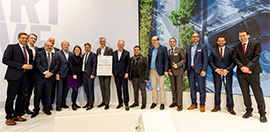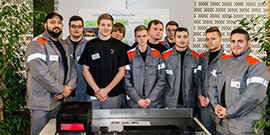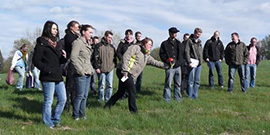The month of March not only brought warmer temperatures, it also brought 12 Salzgitter group employees back together in Hanover for module 2 of our Salzgitter International Training Program (SITP). Compared to our late November session in Dortmund, there was quite a different atmosphere without the Christmas Markets; however we all enjoyed the change of scenery and the new set of challenges that awaited us with the 3-day Development Center and the following 2 days of training.
On the first day we were greeted to the Development Center by Mr. Frank Gießelmann and Ms. Finja Kleppe from Salzgitter and a group of esteemed observers from throughout the Salzgitter organization. It was great seeing such a diverse group from management and the executive team from the various Salzgitter divisions!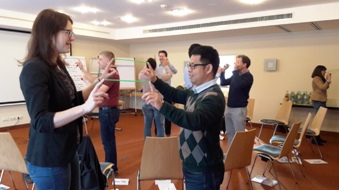
After introductions, we split into two groups and worked on a complex puzzle as a team building exercise. While improving our teamwork and cooperation we managed to reduce the original completion time from over 35 minutes to just 28 seconds. Yet we are still taunted by the 7 second record set by a previous group…
Day 2 kicked off with our individual presentations that we prepared the day before. This was a great chance to present our career ambitions, insights into our present role in the organization, and our educational backgrounds. Afterwards we simulated different scenarios through role playing in front of our observers. These role playing exercises were videotaped so we could watch them later in the day and learn more about our behaviors by observing them ourselves. We also held personal interviews with the observers where we were asked detailed questions about our roles in the organization and to expand on our presentations from earlier in the day.
We started our third and final day of the Development Center with individual meetings with the observers who gave us feedback on the various exercises from the days before. All of us gained constructive takeaways from these sessions and self-awareness about how we conduct ourselves and interact with others. Later in the day we had the chance to revisit topics and activities that we had dealt with over the last 2.5 days. Most of us were excited to have another crack at that puzzle and improve on our time. Finally, we took advantage of some time to sound off in our small groups about situations that we’ve encountered in the workplace and how they relate to the concepts that we practiced in the DC.
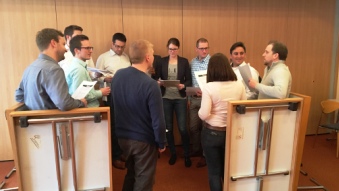 On the 4th day our training session started. During our first exercise we made some experience in leading others and realized that neither pushing someone in a certain direction, nor just telling them what to do is appropriate for leading sensitively. Following up on module 1, we were then occupied with active listening. This time we looked at the different levels of listening and tried to achieve going to the top – to level 5, where we are not just listening to somebody but rather understanding what he/she feels and may be saying between the lines. Although these topics already made us smarter, we took a look at our learning goals for the program and how to make them SMART to increase our chances in achieving them. The first day ended with group presentations and discussions dealing with killer phrases and intercultural conflicts. In the evening we had a delicious dinner at Loretta‘s, an Italian restaurant near the town-hall of Hanover. If you are nearby, let‘s say it with the words from Master Shifu from Kung Fu Panda: Don‘t try it, do it.
On the 4th day our training session started. During our first exercise we made some experience in leading others and realized that neither pushing someone in a certain direction, nor just telling them what to do is appropriate for leading sensitively. Following up on module 1, we were then occupied with active listening. This time we looked at the different levels of listening and tried to achieve going to the top – to level 5, where we are not just listening to somebody but rather understanding what he/she feels and may be saying between the lines. Although these topics already made us smarter, we took a look at our learning goals for the program and how to make them SMART to increase our chances in achieving them. The first day ended with group presentations and discussions dealing with killer phrases and intercultural conflicts. In the evening we had a delicious dinner at Loretta‘s, an Italian restaurant near the town-hall of Hanover. If you are nearby, let‘s say it with the words from Master Shifu from Kung Fu Panda: Don‘t try it, do it.
On our last day in Hanover we continued to work on our conflict management and feedback skills. We started the day with our last group presentation about dealing with criticism in intercultural settings, which perfectly showed us the cultural differences of giving and receiving feedback in India and the United States. Our first group task was called “Bunker”, where an apocalyptic situation should challenge our conflict skills. Nicole and Michael observed us during the whole scenario before we started a group discussion on our different strategies and behaviors for dealing with the conflict. After lunch we returned to some theoretical models of conflict management and relationships and were able to complete a self-scoring exercise, the “Thomas Kilman Conflict Indicator”, to learn more about our personal conflict styles. Our last group exercise of module 2 enabled us to apply the theoretical models in typical daily business conflicts where communication across different levels is necessary.
Yet another week of great experiences and challenges is over and we are all looking forward to meeting again for module 3 in May. Dresden, here we come!
SITP Group 2016



